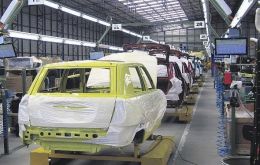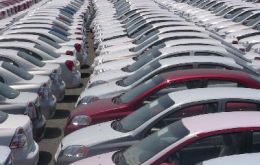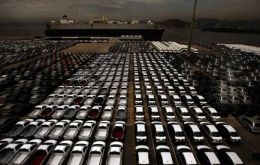MercoPress. South Atlantic News Agency
Tag: cars production
-
Saturday, May 24th 2014 - 00:27 UTC
Argentina's auto sales record last year was fed on 'steroids', claims Fiat CEO

One of Argentina's main industry leaders, Fiat CEO Cristiano Rattazzi. said that the boost of auto manufacturing during 2013 and record sales was fed on 'steroids' and demanded more reliability in the rules to revitalize sales.
-
Wednesday, April 30th 2014 - 09:18 UTC
Argentina's top auto industry leader calls for new markets and lower costs

One of Argentina's main industry leaders Fiat Argentina CEO Cristiano Rattazi denied the existence of a “serious situation” in the automobile industry, “so far” and pointed out the need to “seek new markets” to reverse current downward trends in car manufacturing.
-
Wednesday, March 12th 2014 - 07:28 UTC
Brazil car production up in February but sales dropped in the two months

Motor vehicle production in Brazil surged in February after auto workers returned from vacations, but production remains below levels seen in 2013 and sales have also dropped in the first two months of the year.
-
Tuesday, November 27th 2012 - 04:37 UTC
Leading nations question legitimacy of Brazil’s measures to protect manufacturing

The European Union, United States and Japan presented a formal complaint before the World Trade Organization questioning the legitimacy of some measures adopted by Brazil to protect domestic manufacturing, particularly in the auto industry.
-
Thursday, October 25th 2012 - 06:31 UTC
Argentina reaches surplus target but exports in September plummeted 27%

Argentine exports in September experienced their largest drop since the 2009 financial crisis totalling 6.818bn dollars or 12% less than the same month a year ago, according to the latest report on the country’s foreign trade released by INDEC.
-
Thursday, October 6th 2011 - 02:16 UTC
Uruguayan auto assembly industry exempt of Brazil’s IPI 30% tax increase

In the framework of the so called Plan Maior, Brazil adopted measures to stimulate its industry with the purpose of increasing productivity and containing competition from Chinese produce in its domestic market.
-
Tuesday, September 6th 2011 - 22:15 UTC
Brazilian car industry scaling down production as inventories rise

Metalworkers at a General Motors factory in Brazil decided to go on strike on Tuesday to demand a 17.45% wage increase just as the industry is scaling back production amid rising inventories.
-
Tuesday, September 6th 2011 - 06:17 UTC
Another record month for car production and sales in Argentina

Argentine car makers set a new record for production in August, cranking out 84,655 vehicles amid brisk economic growth, an ongoing consumption boom and soaring exports to Brazil.
-
Thursday, August 4th 2011 - 06:25 UTC
Argentina’s car production up 27.2% and exports 25% in seven months of 2011

Argentina’s car output increased 27.2% in the first seven months of the year and totalled 462,926 units, according to the Association of Automotive Factories (ADEFA). In July production soared to 70,628 units, increasing 22.6% to the same month last year.
